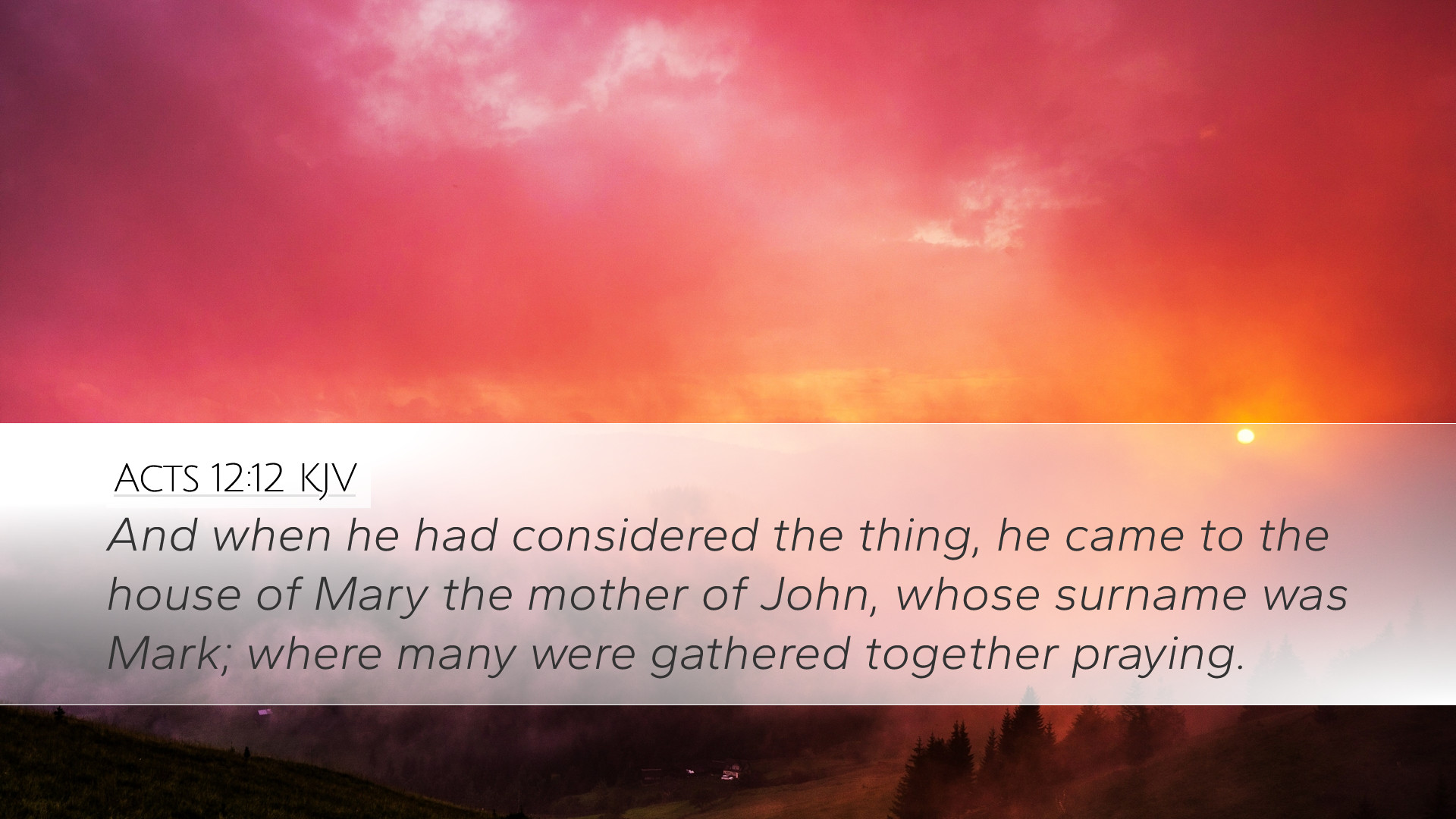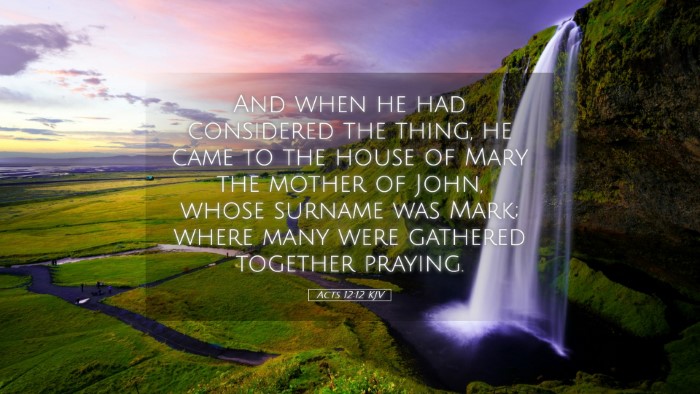Old Testament
Genesis Exodus Leviticus Numbers Deuteronomy Joshua Judges Ruth 1 Samuel 2 Samuel 1 Kings 2 Kings 1 Chronicles 2 Chronicles Ezra Nehemiah Esther Job Psalms Proverbs Ecclesiastes Song of Solomon Isaiah Jeremiah Lamentations Ezekiel Daniel Hosea Joel Amos Obadiah Jonah Micah Nahum Habakkuk Zephaniah Haggai Zechariah MalachiActs 12:12
Acts 12:12 KJV
And when he had considered the thing, he came to the house of Mary the mother of John, whose surname was Mark; where many were gathered together praying.
Acts 12:12 Bible Commentary
Commentary on Acts 12:12
Acts 12:12 states, "When he had considered the matter, he came to the house of Mary the mother of John, whose surname was Mark; where many were gathered together praying." This verse provides a crucial turning point in the narrative of the early church, illustrating themes of fellowship, prayer, and divine intervention.
Contextual Background
This chapter describes a period of intense persecution of the church, initiated by King Herod Agrippa. In earlier verses, we see that Herod had executed James, the brother of John, and imprisoned Peter, intending to further persecute the church. Peter’s miraculous escape from prison, facilitated by an angel of the Lord, serves as the backdrop against which this scene unfolds.
Insights from Matthew Henry
Matthew Henry emphasizes the significance of community prayer in this passage. He notes that the believers had gathered at Mary’s house, where they were earnestly praying for Peter’s release. This suggests how prayer was a central practice among Christians, serving as a means of support and strength during times of persecution.
- Importance of Prayer: Henry states that prayer is potent and effective, particularly in moments of crisis. The believers' prayer signifies their dependence on God, underscoring the truth that when faced with insurmountable difficulties, believers turn to God for intervention.
- Mary's House: The choice of Mary’s house, being the mother of John Mark, portrays the significance of intimate community ties. This gathering illustrates a domestic space transformed into a spiritual sanctuary for communal prayer and intercession.
Albert Barnes' Perspective
Albert Barnes brings out the theological implications of the miracle surrounding Peter's release. He interprets this event as a demonstration of God's providential care over His servants.
- God's Providence: Barnes affirms that the release of Peter was a direct act of divine intervention, revealing God’s ability to orchestrate events for the good of His people. He draws attention to the fact that despite Herod's constraints, God remains sovereign and active in the lives of believers.
- Spiritual Vigilance: Barnes also highlights the vigilance of the church in prayer. The gathering at Mary’s house exemplifies their commitment to spiritual warfare through prayer, suggesting that the early church's tactics against persecution involved persistent supplication to God.
Adam Clarke's Analysis
Adam Clarke offers a detailed examination of the historical and cultural context of the passage. His insights are especially rich regarding the character of Mary and John Mark.
- Mary of Mark: Clarke indicates that Mary, being the mother of John Mark, was likely a prominent figure in the early Christian community. This familial connection to the gospel writer emphasizes the intergenerational transmission of faith.
- Gathered in Unity: Clarke also focuses on the unity of the prayer group. He points out that where there is unity in prayer, there is the likelihood of divine intervention, positing that the collective faith of the believers contributed to Peter’s miraculous escape.
Theological Themes
Acts 12:12 encapsulates several theological themes relevant to pastors, students, and scholars alike:
- Prayer as a Priority: The verse illustrates the priority of prayer in the life of the church. It serves as a reminder that fervent prayer leads to divine outcomes. The early church’s dependence on prayer invites contemporary believers to consider their own prayer practices.
- Divine Intervention: This passage reinforces the concept of divine intervention and miraculous occurrences in the life of believers. The escape of Peter underscores the belief that God is actively involved in the affairs of humanity.
- Community Support: The gathering of believers shows the importance of community in the Christian faith. It emphasizes how collective prayer not only strengthens individual believers but also fortifies the church as a whole.
Conclusion
In summary, Acts 12:12 presents a powerful narrative about the nature of prayer and the community that surrounds it. Through the lenses of Matthew Henry, Albert Barnes, and Adam Clarke, we see how this moment encapsulates the essence of the early church's response to persecution, emphasizing reliance on God through prayer, the power of community, and the assurance of divine providence.
The reflections in this commentary encourage us as faith communities to remain steadfast in prayer and to support one another in times of trial, trusting that God is able and willing to act in response to the cries of His people.


